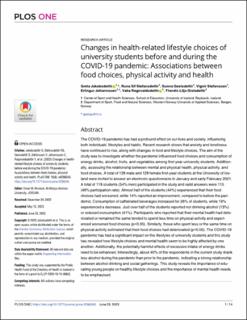| dc.contributor.author | Jakobsdottir, Greta | |
| dc.contributor.author | Stefansdottir, Runa Sif | |
| dc.contributor.author | Gestsdottir, Sunna | |
| dc.contributor.author | Stefansson, Vignir | |
| dc.contributor.author | Johannsson, Erlingur Sigurdur | |
| dc.contributor.author | Rognvaldsdottir, Vaka | |
| dc.contributor.author | Gisladottir, Thordis Lilja | |
| dc.date.accessioned | 2023-09-13T11:04:39Z | |
| dc.date.available | 2023-09-13T11:04:39Z | |
| dc.date.created | 2023-07-11T14:52:52Z | |
| dc.date.issued | 2023 | |
| dc.identifier.citation | PLOS ONE. 2023, 18 (6), . | en_US |
| dc.identifier.issn | 1932-6203 | |
| dc.identifier.uri | https://hdl.handle.net/11250/3089137 | |
| dc.description.abstract | The COVID-19 pandemic has had a profound effect on our lives and society, influencing both individuals’ lifestyles and habits. Recent research shows that anxiety and loneliness have continued to rise, along with changes in food and lifestyle choices. The aim of the study was to investigate whether the pandemic influenced food choices and consumption of energy drinks, alcohol, fruits, and vegetables among first-year university students. Additionally, assessing the relationship between mental and physical health, physical activity, and food choices. A total of 128 male and 128 female first-year students at the University of Iceland were invited to answer an electronic questionnaire in January and early February 2021. A total of 118 students (54% men) participated in the study and valid answers were 115 (46% participation rate). Almost half of the students (44%) experienced that their food choices had worsened, while 14% reported an improvement, compared to before the pandemic. Consumption of caffeinated beverages increased for 26% of students, while 19% experienced a decrease. Just over half of the students reported not drinking alcohol (13%) or reduced consumption (41%). Participants who reported that their mental health had deteriorated or remained the same tended to spend less time on physical activity and experienced worsened food choices (p<0.05). Similarly, those who spent less or the same time on physical activity estimated that their food choices had deteriorated (p<0.05). The COVID-19 pandemic has had a significant impact on the lifestyles of university students and this study has revealed how lifestyle choices and mental health seem to be highly affected by one another. Additionally, the potentially harmful effects of excessive intake of energy drinks need to be enhanced. Interestingly, about 40% of the respondents in the current study drank less alcohol during the pandemic than prior to the pandemic, indicating a strong relationship between alcohol drinking and social gatherings. This study reveals the importance of educating young people on healthy lifestyle choices and the importance of mental health needs to be emphasised. | en_US |
| dc.language.iso | eng | en_US |
| dc.publisher | Public Library of Science | en_US |
| dc.rights | Navngivelse 4.0 Internasjonal | * |
| dc.rights.uri | http://creativecommons.org/licenses/by/4.0/deed.no | * |
| dc.title | Changes in health-related lifestyle choices of university students before and during the COVID-19 pandemic: Associations between food choices, physical activity and health | en_US |
| dc.type | Peer reviewed | en_US |
| dc.type | Journal article | en_US |
| dc.description.version | publishedVersion | en_US |
| dc.rights.holder | © 2023 Jakobsdottir et al | en_US |
| dc.source.pagenumber | 14 | en_US |
| dc.source.volume | 18 | en_US |
| dc.source.journal | PLOS ONE | en_US |
| dc.source.issue | 6 | en_US |
| dc.identifier.doi | 10.1371/journal.pone.0286345 | |
| dc.identifier.cristin | 2161995 | |
| cristin.ispublished | true | |
| cristin.fulltext | original | |
| cristin.qualitycode | 1 | |

